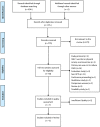A systematic review investigating healthy lifestyle interventions incorporating goal setting strategies for preventing excess gestational weight gain
- PMID: 22792178
- PMCID: PMC3390339
- DOI: 10.1371/journal.pone.0039503
A systematic review investigating healthy lifestyle interventions incorporating goal setting strategies for preventing excess gestational weight gain
Abstract
Background: Excess gestational weight gain (GWG) is an important risk factor for long term obesity in women. However, current interventions aimed at preventing excess GWG appear to have a limited effect. Several studies have highlighted the importance of linking theory with empirical evidence for producing effective interventions for behaviour change. Theorists have demonstrated that goals can be an important source of human motivation and goal setting has shown promise in promoting diet and physical activity behaviour change within non-pregnant individuals. The use of goal setting as a behaviour change strategy has been systematically evaluated within overweight and obese individuals, yet its use within pregnancy has not yet been systematically explored.
Aim of review: To explore the use of goal setting within healthy lifestyle interventions for the prevention of excess GWG.
Data collection and analysis: Searches were conducted in seven databases alongside hand searching of relevant journals and citation tracking. Studies were included if interventions used goal setting alongside modification of diet and/or physical activity with an aim to prevent excess GWG. The PRISMA guidelines were followed and a two-stage methodological approach was used. Stage one focused on systematically evaluating the methodological quality of included interventions. The second stage assessed intervention integrity and the implementation of key goal setting components.
Findings: From a total of 839 citations, 54 full-text articles were assessed for eligibility and 5 studies met the inclusion criteria. Among interventions reporting positive results a combination of individualised diet and physical activity goals, self-monitoring and performance feedback indicators were described as active components.
Conclusion: Interventions based on goal setting appear to be useful for helping women achieve optimal weight gain during pregnancy. However, overweight and obese women may require more theoretically-designed interventions. Further high quality, theoretically-designed interventions are required to determine the most effective and replicable components for optimal GWG.
Conflict of interest statement
Figures

References
-
- Centre for Maternal and Child Enquiries. Maternal obesity in the UK: Findings from a national project. London: Centre for Maternal and Child Enquiries. 2010.
-
- Siega-Riz AM, King JC. Position of the American Dietetic Association and American Society for Nutrition: Obesity, reproduction, and pregnancy outcomes. J Am Diet Assoc. 2009;109(5):918–927. - PubMed
-
- Ovesen P, Rasmussen S, Kesmodel U. Effect of prepregnancy maternal overweight and obesity on pregnancy outcome. Obstetrics & Gynecology 118(2, Part. 2011;1):305. - PubMed
-
- Confidential Enquiry into Maternal and Child Health. Perinatal mortality 2005. London: Confidential Enquiry into Maternal and Child Health. 2007.
Publication types
MeSH terms
LinkOut - more resources
Full Text Sources
Other Literature Sources
Research Materials
Miscellaneous

